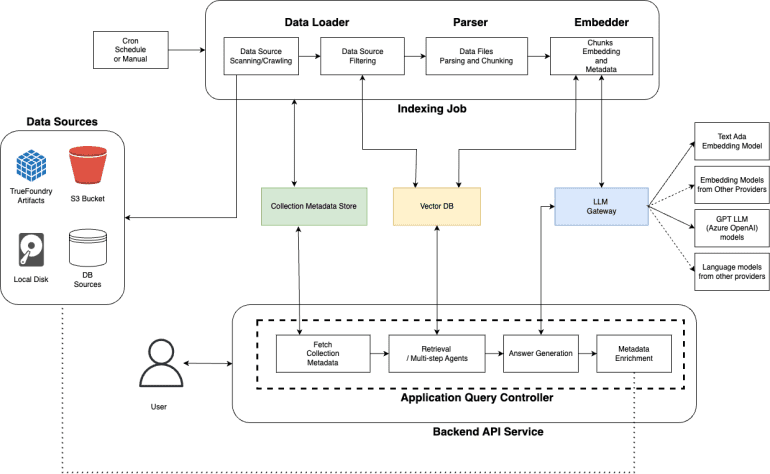- Cognita revolutionizes RAG system development, bridging the gap between experimentation and production environments.
- It offers a meticulously organized framework, built upon Langchain and LlamaIndex, ensuring modularity, scalability, and extensibility.
- Developers benefit from a clean, structured codebase, facilitating experimentation and customization.
- Cognita provides a production-ready environment with local and scalable deployment options and a user-friendly UI for non-technical users.
- Key features include incremental indexing, simultaneous query handling, autoscaling, and seamless integration with existing systems via APIs.
- Support for state-of-the-art open-source embeddings and reranking methods ensures superior document retrieval and question-answering.
- Its modular architecture allows users to tailor components such as data loaders, embedders, parsers, and vector databases to their specific needs.
Main AI News:
As the landscape of Retrieval-Augmented Generation (RAG) system development evolves, the need for sophisticated management and deployment solutions becomes increasingly apparent. While traditional tools like Langchain and LlamaIndex have paved the way for experimentation and initial development, their limitations in modularity, scalability, and extensibility hinder seamless integration into production environments. Enter Cognita, a groundbreaking framework poised to redefine the RAG ecosystem.
At the heart of Cognita lies a meticulous approach to system architecture, meticulously designed to address the complexities inherent in RAG system development. Building upon the foundations laid by Langchain and LlamaIndex, Cognita introduces a paradigm shift, ensuring every aspect of the RAG landscape is imbued with modularity, driven by APIs, and primed for seamless extension. Developers rejoice in the prospect of maintaining a pristine codebase, fostering effortless experimentation and bespoke customization, all while embracing a production-ready environment.
Cognita’s prowess shines through in its ability to streamline the organization and deployment of RAG systems. Key features include support for incremental indexing, enabling efficient processing of new or updated documents, thereby alleviating computational overhead. Additionally, Cognita boasts:
- Simultaneous query handling capabilities.
- Autoscaling mechanisms to gracefully accommodate spikes in traffic.
- Seamless integration with existing systems via robust APIs.
Notably, Cognita stands as a testament to innovation, offering support for cutting-edge open-source embeddings and reranking methods, ensuring unparalleled document retrieval and question-answering performance. Its modular architecture empowers users to tailor every facet of the system, from data loaders to parsers, fostering unparalleled versatility and adaptability in RAG system development.
Conclusion:
The introduction of Cognita marks a significant leap forward in the RAG system market. Its comprehensive framework addresses the pressing challenges of modularity, scalability, and extensibility, providing developers with the tools needed to seamlessly transition from experimentation to production. With its array of features and support for cutting-edge methodologies, Cognita sets a new standard for RAG system development, poised to shape the future of information retrieval and generation technologies.

